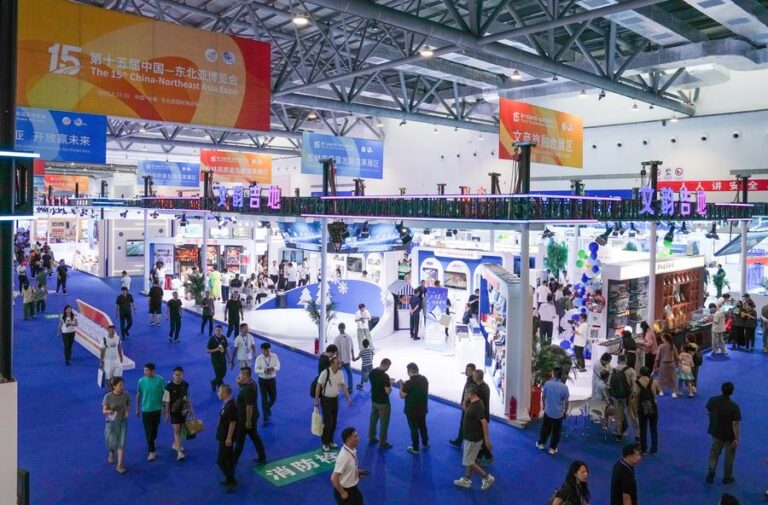CHANGCHUN, Aug. 28 (Xinhua) — The ongoing 15th China-Northeast Asia Expo, held in Changchun, capital of northeast China’s Jilin Province, highlights regional cooperation on green transition and sustainable development.
Nyam-Osor Uchral, Mongolia’s First Deputy Prime Minister and Minister of Economy and Development, hailed the expo as a platform for cooperation in the regional economy, trade, investment, infrastructure and technological innovation.
Noting Mongolia’s endowment of natural resources and renewable energy, as well as its proximity to Chinese and Russian markets, he said the country is committed to shifting from resource and labor-intensive industries toward sectors driven by smart technology, value-added production, and finished goods and services.
Mongolia looks forward to adopting environmental protection technologies and boosting investment in energy, infrastructure and industry to foster a more balanced and sustainable economic structure, he said, adding the country also aims to optimize its trade structure and expand both the volume and variety of non-mineral exports.
Close economic and trade ties have provided a solid foundation for the green transition in Northeast Asia. In 2024, trade between China and the five Northeast Asian countries — Japan, the Republic of Korea (ROK), the Democratic People’s Republic of Korea, Russia and Mongolia — reached 901.6 billion U.S. dollars, up 1.6 percent year on year, accounting for nearly 15 percent of China’s total foreign trade, according to the Ministry of Commerce.
Investment cooperation between China and the five Northeast Asian countries has also gradually expanded into emerging fields such as the digital economy, green development, advanced manufacturing and modern services.
Roh Keon-ki, deputy minister for trade negotiations at the Ministry of Trade, Industry and Energy of the ROK, stated that the expo host Jilin is a key node for ROK-China exchanges. He added that the old industrial base province leads in automotive and rail transportation industries, and is growing into a regional innovation hub by spearheading high-quality development and promoting digital and green transformation.
Faced with common challenges such as sluggish global economic growth, Roh urged countries to join hands in sharing experience and resources, expanding cooperation for inclusive growth and common prosperity, building a predictable trade and investment environment, and exploring innovative solutions for digital transformation and carbon neutrality.
Themed “Join Hands with Northeast Asia, Open Up for a Win-Win Future,” the expo, jointly organized by the Ministry of Commerce, China Council for the Promotion of International Trade, and the Jilin provincial government, runs from Aug. 27 to 31, and is celebrating its 20th anniversary this year.
This edition of the expo features an exhibition area spanning 73,000 square meters with 3,620 international-standard booths. More than 1,000 enterprises from 45 countries and regions worldwide have participated in the event.
German chemical giant BASF is actively embracing the push for green development. Since 2011, the company has collaborated with Jilin Agricultural Technology Promotion Station, and applied its biocide in rice and corn in the province, achieving reduced pesticide use while boosting efficiency, grain quality and yield. In 2021, BASF teamed up with the Chinese Academy of Sciences to establish a sustainable materials laboratory in Changchun, accelerating the commercialization of innovative research.
Jens Hildebrandt, vice president of government relations at BASF Greater China, said the company is also committed to expanding surface treatment business, enhancing automotive industry value chains, and deepening co-creation with local partners, including the Changchun-based China FAW Group Co., Ltd. “By leveraging technologies and R&D capabilities in automotive coatings, BASF helps develop more efficient, environmentally friendly and sustainable vehicles,” he added.
BASF has built around 30 production sites and a regional R&D center in the country. The company has invested around 14 billion euros (about 16.3 billion U.S. dollars) in Greater China together with its partners, and in 2024, it generated sales of 9.3 billion euros in the market, accounting for almost 13 percent of the group’s total sales.
“China is changing its growth model and placing a strong focus on sustainability. BASF is determined to contribute to this development and enable our local customers’ green transformation,” Hildebrandt said. ■

